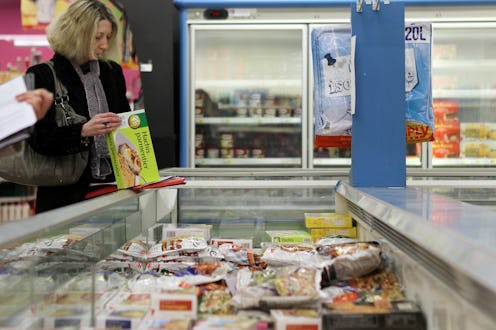News
Amy's Kitchen Products Recalled For A Scary Reason
Organic food lovers, be warned. On Monday, frozen food outfit Amy's Kitchen recalled nearly 74,000 food products for possible listeria contamination in its organic spinach supply. The company issued the announcement after one of its spinach suppliers alerted officials to the potential presence of the bacteria, which can cause fever, convulsions, gastrointestinal distress, and miscarriages in pregnant women.
At the time of the announcement, the company said it had not received reports of infection from any of its consumers. "Amy's Kitchen is not aware of any illness complaints to date related to the recalled products," wrote a spokesperson in a press release. "Out of an abundance of caution, however, Amy's Kitchen is recalling these products based on the recall notice we received from our supplier."
In recent days, several other food giants have issued similar recalls. On March 17, Kraft Foods was forced to issue a recall of its beloved macaroni and cheese product after it was discovered that several boxes contained small metal fragments. Of course, the recall was much wider — nearly 6.5 million boxes to be exact.
"Kraft has received eight consumer contacts about this product from the impacted line within this range of code dates and no injuries have been reported," the company wrote on its website. "We deeply regret this situation and apologize to any consumers we have disappointed."
So far, the list of potentially contaminated Amy's products includes several of their popular products, such as the Vegetable Lasagna, Spinach Pizza, Brown Rice & Vegetable bowls, and Enchilada Verde meals (you can view the rest of the list in their official release). New York-based food market Wegman's has pulled over 12,000 frozen organic spinach products from its shelves as well.
According to the CDC, nearly 1,600 cases of listeria infection (or "listeriosis") are reported nationally each year. Approximately 17 percent of those cases are fatal, reported CNN in January. Of those 1,600 cases, around 14 percent occur among pregnant women, which can cause serious problems for the developing fetus, including premature delivery or infection and, in the worst cases, death.
In 2011, a 17 state-wide listeria outbreak prompted store owners to pull hundreds of cantaloupes from shelves after the infected fruits killed nearly three dozen consumers. The two Colorado farmers responsible for distribution were eventually charged with a misdemeanor and forced to pay $150,000 in restitution to victims' families.
"This has been a huge tragedy," said Eric Jensen of Jensen Farms in a statement to a regional CNN affiliate last February. "We are very, very sorry [and] we hope it leads to better understanding of food safety."
Images: Today's Parent/Twitter
